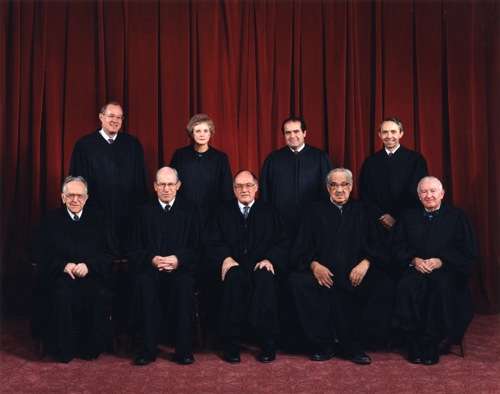The Volokh Conspiracy
Mostly law professors | Sometimes contrarian | Often libertarian | Always independent
Today in Supreme Court History: May 23, 1991
5/23/1991: Rust v. Sullivan is decided.

Editor's Note: We invite comments and request that they be civil and on-topic. We do not moderate or assume any responsibility for comments, which are owned by the readers who post them. Comments do not represent the views of Reason.com or Reason Foundation. We reserve the right to delete any comment for any reason at any time. Comments may only be edited within 5 minutes of posting. Report abuses.
Please to post comments


Rust v. Sullivan, 500 U.S. 173 (decided May 23, 1991): Congress can prohibit family planning agencies receiving federal funds from mentioning abortion either in their publications or in individual counseling (this was a plot point in the 1992 movie “Just Another Girl on the IRT”)
Foster v. Chatman, 578 U.S. 488 (decided May 23, 2016): Batson challenge as to using peremptory challenges to exclude the only black prospective jurors can be revived upon discovery of documents in prosecution files highlighting everyone in jury pool who was black
General Dynamics v. United States, 563 U.S. 478 (decided May 23, 2011): government and defense contractor are stuck with contract despite cost overruns and dissatisfaction on both sides because litigating the contractor’s defense that failure to perform was due to government refusal to share “superior knowledge” would necessarily involve disclosure of state secrets; suit by contractor in Court of Federal Claims dismissed
Johnson v. Zerbst, 304 U.S. 458 (decided May 23, 1938): whether defendant’s waiver of right to counsel under Sixth Amendment was “intelligent” and “competent” is question for trial court (his inability to actually afford a lawyer presumably would be a valid reason for waiver; this was before Gideon v. Wainwright)
Clingman v. Beaver, 544 U.S. 581 (decided May 23, 2005): restricting primary election to registered party members did not violate First Amendment “freedom of association”
Sanger v. Nightingale, 122 U.S. 176 (decided May 23, 1887): A suit alleging a fraudulent mortgage, involving the effect of a statute of limitations requiring pre-1865 claims to be brought by 1870. Interesting because one of the issues was the valuation of 120 slaves on the estate as mortgaged in 1855 who were lost due to emancipation.
Brown v. Plata, 563 U.S. 493 (decided May 23, 2011): remedy for overcrowding causing Eighth Amendment injury to mentally ill prisoners was to decrease the prison population (to only 137.5% of design capacity)
Budinich v. Becton Dickinson & Co., 486 U.S. 196 (decided May 23, 1988): adjudication of state law claim on merits is appealable “final judgment” under 28 U.S.C. §1291 despite remaining issue of attorney fee award even if under state law fees are part of the judgment
Morgan v. Sundance, Inc., 596 U.S. 411 (decided May 23, 2022): As those of us in this field know, you can interpose arbitration as an affirmative defense, but you have to move to dismiss/compel arbitration before meaningful discovery takes place (and certainly before the statute of limitations has run). Here, where restaurant chain employees had brought a “collective action” alleging violation of overtime pay laws, the Court, construing the Federal Arbitration Act, holds that one objecting to late arbitration doesn’t have to show that there was prejudice due to the delay (remanding to Circuit Court question of whether restaurant chain acted inconsistently with its right to arbitrate).
United States v. Wong, 431 U.S. 174 (decided May 23, 1977): defendant prosecuted for committing perjury in front of grand jury not entitled to suppression of false statement despite not having been informed of right to remain silent
Foster - another House Negro dissent from Thomas.
What the fuck is wrong with you?
Nothing, but thanks for asking.
Let’s say it’s Thomas’s cousin on trial for killing a white woman. Somehow due to peremptory challenges it ends up being an all white jury. Undeniable proof emerges that the prosecution kept black people (one indicator, working just from names, is that one is a member of “a black church”) off the jury. Thomas says that’s ok.
Thomas wants to overrule Batson, just as he wants to overrule Brown. This is not his considered opinion; even after 32 years on the Court he still acts like Constitutional law is a complete surprise to him.
Is SRG2 being crude in using a slave analogy? Thomas is the one who cheapened the sufferings of his ancestors by saying he had been “lynched”. So yes, what SRG2 said might be crude, but he’s not being unfair.
Interestingly, this rhetoric directed at Clarence Thomas more than at any other Justice occurs during a discussion of invidiously singling out black participants in the justice system.
"invidiously singling out black participants in the justice system"
Odd, but in a way true: Emmett Till and Thomas were both "participants in the justice system".
Thomas is being singled out deservedly.
He’s been deservedly singled out as a “house negro”?!?!
I’m not agreeing with his preference for finality of judgments issued against guilty murderers, especially those whose cases have been going on for 30 years. There’s legitimate debate here. But even if he’s wrong, that hardly justifies terms like “house negro” or “Emmet Till” (even if he *did* use a lynching metaphor 30 years ago – so unlike other participants in public life who never indulge in racebaiting).
The *disproportionate* hostility can be accounted for because of his race. Specifically, to the fact that, to his critics, he doesn't hold the views a black person is supposed to have.
You think the fact that he called himself a victim of lynching has nothing to do with it? You call that "racebaiting"??
I’m saying he *engaged* in racebaiting over 30 years ago. That’s not the reason he’s getting attacked over 30 years later, given that more recent racebaiting by others often gets a pass.